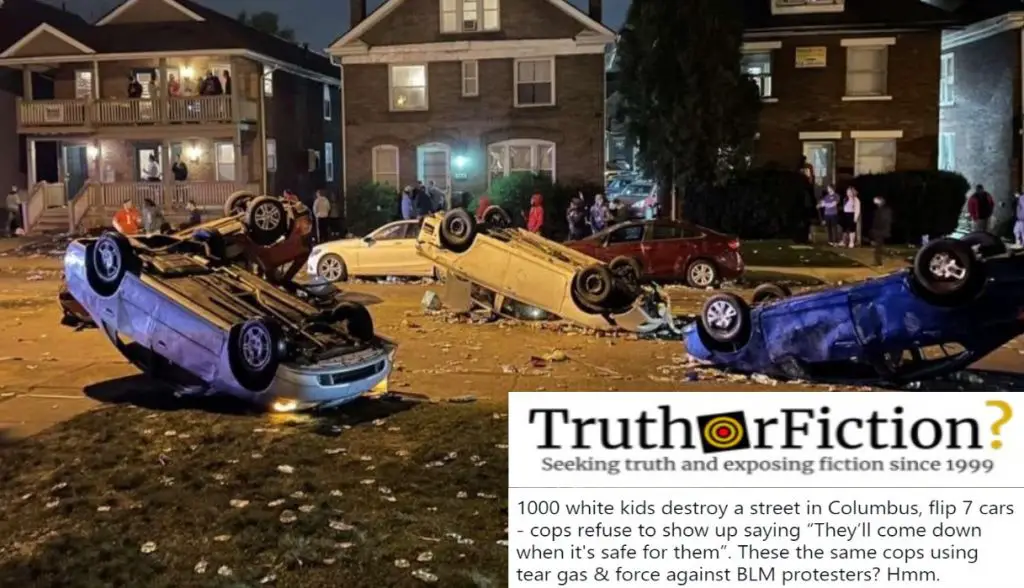As criticism swirled around the police department in Columbus, Ohio for its extrajudicial killing of 16-year-old Ma’Khia Bryant, more than a few commenters on social media pointed out that officers seemed much less aggressive when it came to a local “street party” with a history of causing property damage and injuries.
Less than a week before Bryant was shot and killed by an officer on April 20 2021, news reports and social media posts circulated about the events at “ChittFest,” a student block party at Ohio State University, to mark the school football team’s annual spring intrasquad game.
According to the Columbus Dispatch and the student newspaper the Lantern, more than a thousand revelers gathered on Chittenden Avenue on April 17 2021 for the latest installment — in spite of several guidelines against such events in light of the COVID-19 pandemic.
Senior Lauren Taras told the Dispatch that she witnessed several people turning her car onto its side with some “beating on the car’s hood.” The newspaper reported:
Taras said she spent the next two hours fending off drunken revelers while protecting her car and trying to call the police. Neither effort was very successful, she said.
“The police dispatcher told me, and I quote, ‘They have other things to worry about and they’ll come down when it’s safe for them,'” said Taras, 22, of Cleveland. “I’m really disappointed there were no police there.”
By the time police arrived, around 3 a.m., Taras said, the people who damaged her car were long gone. Her arms are covered in bruises, she said, from shoving people away.
“There were no repercussions, no arrests made,” she said. “I need to find the people who did this.”
Both newspapers confirmed that no arrests were made, despite the damage — not just to residents’ cars, but also but to some residences, which prompted Taras to question that lack of response compared to police treatment of demonstrators protesting against police violence.
“What does that have to say about this summer? People were peacefully protesting and got pepper sprayed,” she said. “People flip cars on campus and nothing. No repercussions, no arrests.”
Taras and other social media users also posted footage of the crowd — which appeared to be predominantly white — vandalizing cars with no sign of a police response:
A separate photograph, purportedly taken at the scene, also spread online on Twitter following a post by Laurenn McCubbin, who chairs the department of Illustration and Comics & Narrative Practice at the Columbus College of Art & Design:
“The cops didn’t come after these (mostly) white kids with pepper spray and tear gas, even though they had multiple 911 calls from people in the neightborhood saying that the (unsanctioned) party had gotten out of hand, property was being destroyed, and people were in danger,” McCubbin told us in a follow-up comment. “There is a marked difference between police actions here and what happened at peaceful BLM protests over the summer.”
Police were indeed far more aggressive in their response to 2020 protests against the extrajudicial killing of George Floyd in Minnesota, including the liberal use of chemical agents, such as pepper spray. Mayor Andrew J. Ginther also imposed a local protest during those demonstrations, which allegedly resulted in vandalism and reports of small fires.
Since the incident, interim Police Chief Mike Woods has claimed that his department’s resources were strained the night of the “Chittfest,” and that his department did not anticipate such a sizable crowd of revelers.
“I’m not going to send a small number of officers into a group of 2,000 to try and address that, so we waited until the appropriate time,” he said two days after the incident. “We tried to work with [the university] to get information out to those students to tell them enough is enough, but once we knew that cars were being flipped, we got enough officers together and approached that area.”
- More Than A Thousand Students Rave On Chittenden, Flip Cars, No Arrests
- Ohio State Students Angered by ChittFest Damages, Police Response
- Ohio State, Columbus Police Working to Identify Those Involved in Vandalism During Block Party
- Firefighters Battle Blazes as Columbus Curfew Takes Effect
- Police Deploy Pepper Spray as Protests Over Death of George Floyd Spread to Columbus
- Columbus Police Shoot And Kill Black, Teenage Girl

